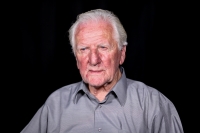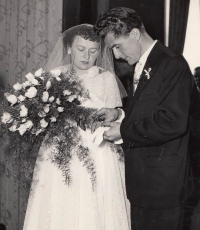They should have stayed home
Download image
Zdeněk Vlk was born on June 15, 1933 in the village of Chýšť near Pardubice. He spent his childhood in Zábědov near Nový Bydžov, where he went to general school and where he also experienced the end of the Second World War. He remembers the Soviet soldiers of the cavalry unit who camped in the garden of his grandparents. His father made a living as a civil servant and the family moved often because of his work. After the war, they lived in Poděbrady, where Zdeněk was part of a scout troop. He graduated from secondary technical school in Hradec Králové, where he then started working in the company Zásobování vodou a kanalizace (“Water supply and sewage”), later called Vodovody a kanalizace, where he spent 46 years of his life. In the years 1955–1957, he served in the army with the 2nd Air Fighter Regiment. In 1956, he went through training at the Hungarian border during the anti-communist uprising. He got married in 1960. He refused to join the Communist Party, which limited his professional career. He did not agree with the Soviet occupation during the normalisation inspections. He was involved in the field of civil defence and in the scientific and technical society, otherwise he concentrated more on family life. He welcomed the change of regime in 1989 and is still interested in the political situation. In 2019, he lived with his wife in the village of Lejšovka near Hradec Králové.

